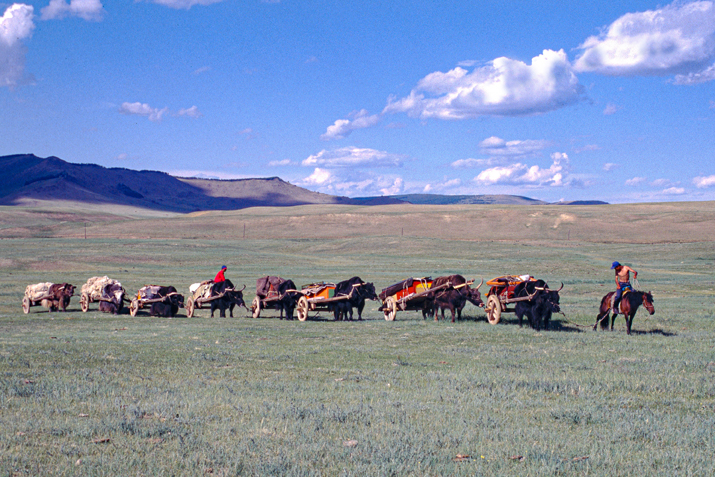
The icy messenger from Khovsgol Nuur and the divine order
N 50°10'999'' E 100°03'527''
Day: 91
Sunrise:
07:54
Sunset:
18:14
As the crow flies:
22,25
Daily kilometers:
31
Total kilometers:
864
Soil condition:
Meadow, scree, rock
Temperature – Day (maximum):
9°C
Temperature – day (minimum):
minus 2°C
Temperature – Night:
minus 16°C
Latitude:
50°10’999”
Longitude:
100°03’527”
Maximum height:
1850 m above sea level
Time of departure:
11:40
Arrival time:
18:30


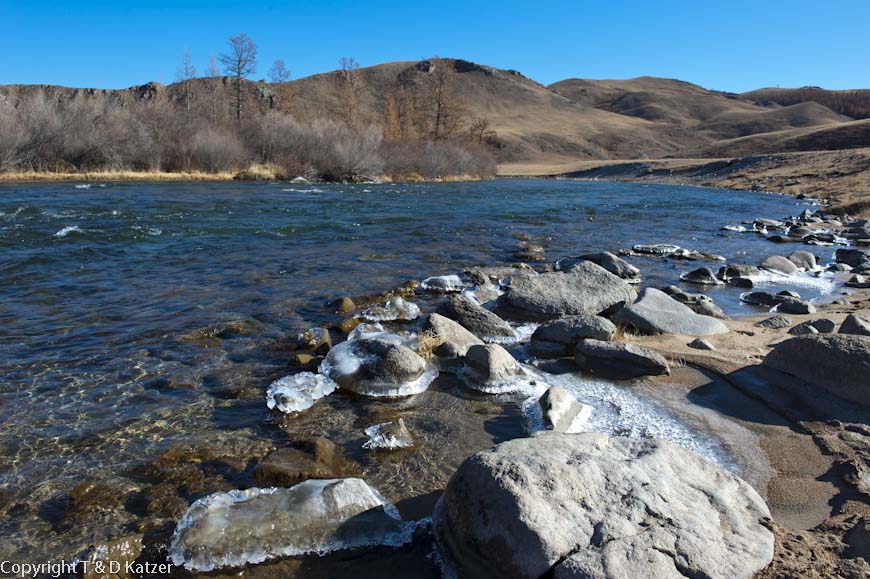
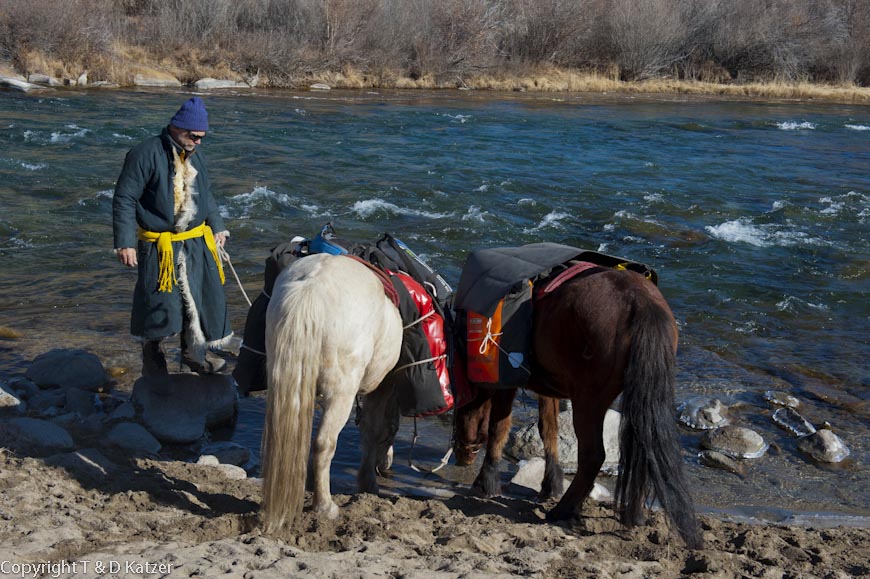

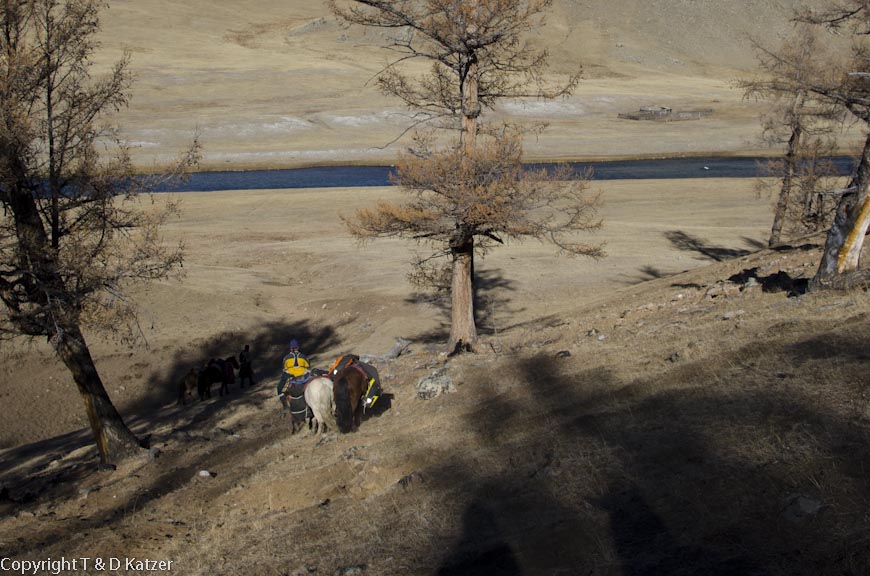

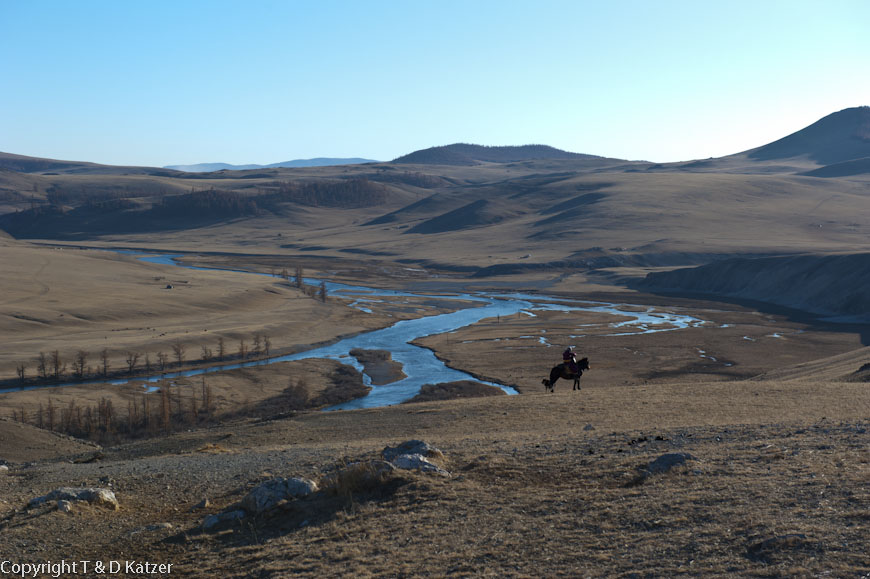
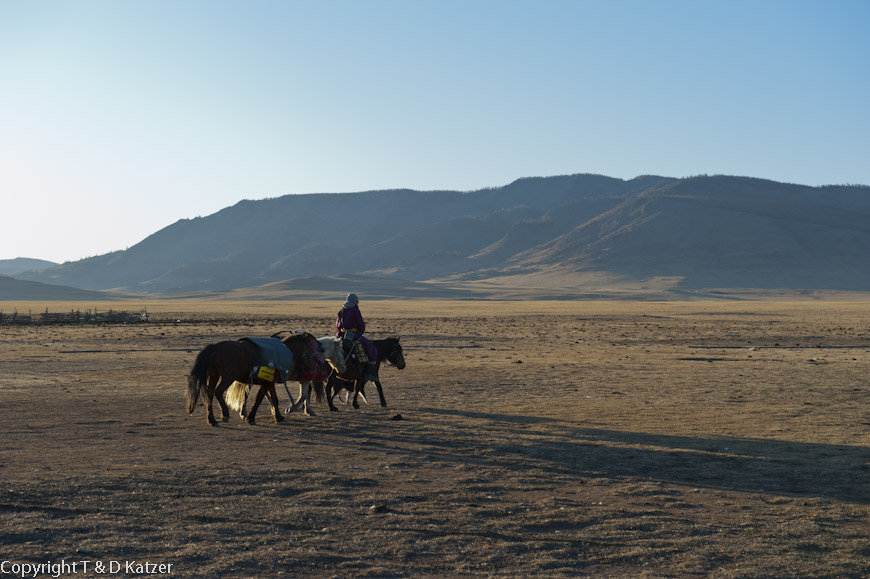
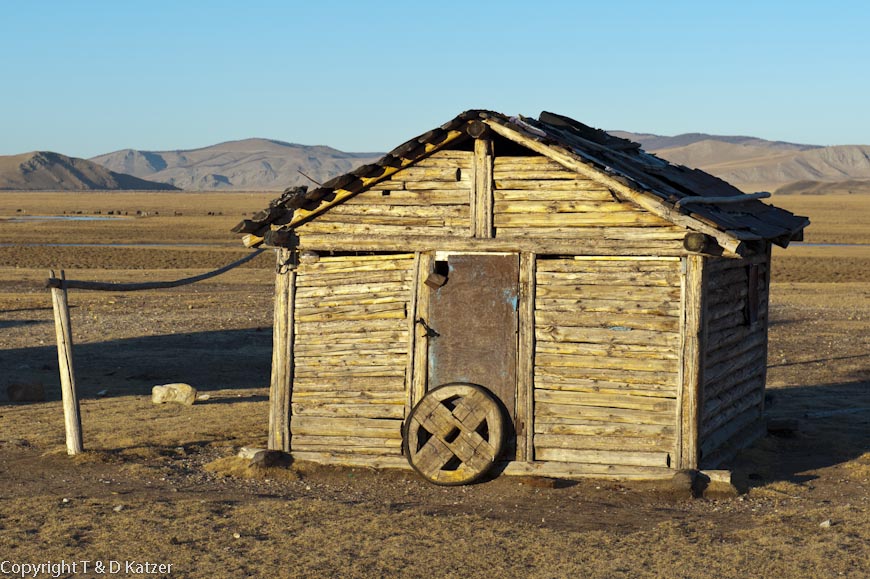
“Were you freezing tonight?” asks Tanja Bilgee. “Ha, ha, ha. Your hot water bottle is really good. It was really dulaan”, (warm) he replies in a great mood. “It’s another stroke of luck to have three hot water bottles with you,” says Tanja with a wink.
Today, on the fourth morning of this stage, something like routine is already emerging. Our movements become faster. Everyone knows what they have to do. What’s more, we are pampered with warming energy rays from the glistening distant star and the thermometer climbs to a remarkable plus 4° in the late morning. I am on my guard when loading the horses, especially Sharga and Bor. Standing so as not to be stepped on and keeping an eye on Sharag’s biters, we heave the loads onto the horses’ backs.
Although it takes us almost four hours from the time we open our eyes to the time we sit in the saddle, we are not dissatisfied. Bilgee spurs Tenger and Od on and they quickly fall into a trot. There is a slight ascent. Then we have to stop again because of the sliding load. In the meantime, it hardly upsets me anymore. Because until the contents of the large duffel bags have shaken out properly, we usually have to stop after a few kilometers to bring them back into balance. If we’re lucky, it will be fine all day afterwards. Provided I distributed the contents of the duffel bags evenly during the morning packing. As the distribution changes daily due to our incessant food consumption, this is a constant challenge.
After just an hour, we reach a narrow valley jagged with rock. “Denis! What do you think? Should we take the left or the right path?” asks Bilgee, as the path forks in two directions in front of us. I look at my GPS with uncertainty. Both paths lead in the wrong direction. But one more than the other. As the valley winds like a snake and we are literally trapped in it, every answer can be right or wrong. “I’d take the one on the left,” I reply, trusting my instincts. Bilgee nods, smiles and follows the left mule track, which soon becomes completely lost in the rough scree. “Was that the wrong decision?” I ask myself. When the path becomes visible again on the other side of the scree field, I am relieved. I don’t have the slightest desire for detours. Suddenly we come across a mighty river, the Egiyn Gol. “If we have to go over there, we have a problem,” I say to Tanja. “What does the GPS show?” she asks. “The maps on the GPS are too inaccurate. I’ll have to consult the navigation maps tonight,” I reply.
Caution: risk of overheating
We sit on the banks of the river and bring our horses to drink. A shepherd watches us from a distance. Bilgee sets off to ask him for directions while Tanja and I take our time leading the horses to Egin Gol one by one. My heavy winter coat makes me sweat like a monkey. I’m literally dragging myself back and forth and think I’m going to die of heatstroke at any moment. Of course, I could quickly remedy the situation by taking the thing off. But I would have to hobble the horses first. As bending down in my Mongolian armor is also very strenuous and I don’t know where to stow the bulky coat, I decide to sweat for the time being. Standing by the river, I wait until Sharga and Bor have filled their bellies with the delicious ice-cold water. Rings of ice formed around the large pebbles in the water. Oh, how I would love to pour a cup of ice water over my head right now. Mogi is tied to a stake carved into the ground and plays happily with the shepherd’s dog. Then Tanja unties him briefly and the dogs race to the river, panting and visibly overheated from their wild play, and lo and behold, they both jump in to cool off. “Oh dog you should be,” I think and head back to the others with my horses in tow.
Meanwhile, Bilgee comes with the shepherd and sits down with him and his young son on the dry grass. They talk animatedly about things we don’t understand. The conversation often also involves explaining the route. “Are you cold?” the shepherd asks me, furrowing his brow. “Cold? No, I’m not cold,” I reply, only now realizing that I’ve been taken for a ride by the man. He’s probably wondering how I’m going to survive a winter in Mongolia if I’m wearing a coat that was sewn for minus 30° or 40° degrees in the sun at around plus 20°. But how am I supposed to explain to the man that I’m wearing the coat because otherwise I don’t know what to do with it? By now the water is running down my body in torrents and building up in my monster boots, which according to the manufacturer were designed for temperatures down to minus 70 degrees. In the end, it’s only a matter of minutes before my circulation shuts down and I fall off my feet. In my mind’s eye, I see the imaginary headline of a daily newspaper. German adventurer dies of stroke in Mongolian autumn. “I have to get out of here!!!” I shout and frantically tear the Deel off my body. “For God’s sake. What are you doing Denis?” Tanja looks at me in amazement. “Man, oh man, this thing is really life-threatening. There should be a warning on it. Warning: danger of overheating!” I lament. Then I neatly fold up the dangerous coat and tie it to my banana, which, as already explained, is behind the saddle. “I hope it holds,” I say. The shepherd watches me with a grin. Somehow I feel like a stupid tourist who wants to wear a Deel like this at any price. The main thing is that it looks cool. Regardless of whether the weather is suitable or not.
After a while, we leave the friendly shepherd and follow the banks of the river. After the first turn of the Egiyn Gol, the entire left bank lies in dark shadow. The thermometer has instantly dropped to minus two degrees. If I had held out just five minutes longer, I could have saved myself the trouble of stowing the deel and the suffering would not have been in vain.
The hooves of our horses stumble over coarse river rocks. Thick, hard-frozen roots, branches and other undergrowth get in the way. Definitely not a path for horses that carry a rider. The watercourse reaches further and further to the left bank until it almost swallows it up. We juggle along on a frozen path about one meter wide. Then we are forced to lead our horses through low ice water and over ice floes. They willingly allow themselves to be guided and seem to trust our judgment. Suddenly the path ends and urges us to follow it up a steep hill. We carefully steer our animals along a gorge. One misstep and they would crash with us. Bilgee seems to take the terrain quite calmly. But he is also Mongolian and used to such rough terrain. His calmness is transferred to us, which is why we follow him carefully and deliberately. Again unexpectedly, the mountain in front of us slopes down into a steep gorge. We are forced to make our way down into the valley to get closer to the river again. Tanja and I lean our upper bodies back like acrobats as we make a hair-raising descent. “Just don’t make a mistake,” it goes through my head. But even our sure-footed horses can’t afford to slip up. Then we reach the valley of the Egiyn Gol without incident. We follow the river for a while only to have to cross one of the stony mountains again a few kilometers later. When we reach the river delta, we meet shepherds bringing their flock of sheep to market in Mörön. Bilgee talks to them. Both men ask each other about the route. The shepherd reports that he accidentally burnt his tent only last night. “Now I have to sleep outside,” he says with a laugh. As he rides after his sheep again, we take advantage of the dry grass for a rest. Tanja opens a tin of fish, which we devour ravenously with the rest of our bread.
“Is there a telephone connection here?” she asks. “Would be a miracle. Why do you ask?” “I’ll try calling Saraa. If we’re lucky, the Deel we wanted to buy for Bilgee is still available. Maybe she can send it to Khatgal. When will we get there?” she wants to know. “Hm, if everything goes smoothly, we should be there the day after tomorrow. But where should she send him? We don’t have an address,” I ask. “Mongolians always have an address, almost everywhere.” “You could be right,” I reply. As the Deel is supposed to be a surprise, Tanja leaves us, climbs up a hill and tries to reach Saraa on her cell phone. It doesn’t take long for incomprehensible fragments of words to fly over to us. “So, did you actually get a cell phone network in this secluded place?” I ask as she sits back down on the grass with Bilgee and me with a smile on her lips. “Yes. And I’ll give you three guesses whether the coat still exists.” “Judging by the look on your face, the deal works.” “Yes. I was able to negotiate the price down to 120,000 tugrik (€69). Saraa will give it to a woman who runs a guesthouse in Khatgal today. She happens to be in Mörön and is going back today. Well, is this divine order or not?” she says triumphantly, having made the impossibility possible.
The Divine Order
At this point in my writing, I am faced with the challenge of putting the Divine Order into words, of explaining it. But after just a few sentences I start to stumble, I don’t have the vocabulary. Strange. For me, the concept of divine order is something that determines my and Tanja’s everyday life. But explaining it is a task I hardly feel up to. Asking Mother Earth in this case is an idea that is running through my brain. Can I really ask them about this? Not easy if you don’t have an address where the communicative part of our planet lives. I also can’t just dial her phone number to call her. But I’ll try with my words. “So mother earth. Can you please explain the divine order to me?” “If it’s useful to you, please,” I hear the voice very softly and I’m not sure if it’s my own. Is it just wishful thinking to talk to Mother Earth? A wish that I fulfill by answering myself? “You don’t need to force yourself to give an answer. That won’t work. As you know, I always answer you when you have questions.” “Oh, it’s wonderful to have made contact with you so quickly and unexpectedly. A friend of ours brought the concept of divine order into our lives. We have lived with it ever since. At first it was just a statement for Tanja and me. Over the years, the statement manifested itself as an undisputed fact in our everyday lives. At the beginning of this paragraph I wanted to put the divine order into words and explain it. However, I realize that it is not that simple,” I say.
“The Divine Order is a formulation for God. For everything that is. It means for you humans that everything that happens is unchangeable. That everything that happens happens exactly as it has to happen. If you surrender to the divine order and let life happen, life is not difficult. There is no point in rebelling against facts. It only costs useless energy. Your life becomes easier if you let events and happenings that enrich your life flow. That means not rebelling when something goes differently than you planned. In the deserts of Australia, one of your tasks was to understand how to let things flow. Can you remember that?” the voice asks me. “How could I forget that. I’ve been carrying this task around with me for three years.” “And you solved it for yourself.” “Yes, I did.” “And then you find it difficult to put the divine order into words?” “Yes.” “Well, letting things flow is part of the divine order. It’s an essential aspect of it.” “I see. But the penny still hasn’t dropped. I still can’t put it into words.” “Then I’ll give you a well-known example that plays a role in your recent life story. Please think of Bilgee. Quite unexpectedly, he didn’t want to ride the horses back.” “Hm, that’s right. But we’ve already covered that,” I reply. “Yes, only there is a connection to everything that happens. Another explanation. His behavior is just as much a part of the divine order as your understanding. Simpler. It was and is Divine Order to finance new windows for Mörön’s prison through Bilgee’s behavior. This positive action is attributable to Divine Order, to letting things flow. You did not fight against Bilgee’s behavior and thus senselessly hardened the situation. This would not have resulted in anything productive except possible destruction.” “Like destruction?” I hear attentively. “If you had sent Bilgee home, he might have gotten angry. Anger gives rise to destructive thoughts whose consequences can bring destruction. He wouldn’t have ridden with you to Tsagaan Nuur either. And that would not be beneficial for you and your expedition. But you’ll find out later. What matters to me now is that you understand the connections. At least a fraction of it. Let’s start again. Bilgee’s behavior leads to windows in the prison. You have not resisted but accepted. That was positive. Among other things, this means letting things flow. But it also means that you have moved within the divine order. Whenever you move in the Divine Order, the result of the movement will be pleasant for you. The Divine Order also means the flow of life. Obstacles will collapse in an instant. Everything is smoothed out. Love is around you. Love also means true happiness. Love is the great force that guides you through a desirable life. Divine order and love belong together and cannot be separated from each other. Divine order and flow are mutually dependent. Are a symbiosis. One unit. The Divine Order stands for a life in flow. For a life without obstacles. It stands for fulfillment and progress. Progress also in the sense of moving forward. And you do. Tanja and you move forward. Every day. Ask questions and that’s a good thing. Because whoever asks questions gets answers. This makes your life a continuous learning process. Through learning you understand connections and these are important to grasp. Because nothing stands alone. Everything is connected. Absolutely everything you can and cannot imagine. You can see that the Divine Order cannot be explained in one sentence. It cannot be summed up in a few words, but is the umbrella term for everything that is. And if your life is your greatest treasure, the Divine Order is the best and most suitable guide to a harmonious and fulfilled life.
But the divine order is not just a life companion, everything that exists is subject to it,” I listen spellbound. “You are also subject to the divine order. Isn’t that right?” I ask. “We are also subject to it. We the earth with everything that is on and in us and this and other universes. The entirety of all celestial bodies and the space surrounding them are subject to the divine order,” explains Mother Earth. “Man oh man. I only asked one little question and your answer ends up in the universe,” I groan, trying to understand the scope of the explanation. “Our answer does not end in the universe but goes far beyond it. It is so comprehensive that it makes no sense for you to add further explanations at the moment. What is important for you is to understand the Divine Order in its beginnings and to continue to consult it as your life coach. That you continue to let your life flow and do not build up useless, energy-sapping obstacles where there are none. Then you can achieve more with your life energy than you dared to dream.”
The sun is already low. We cross another ridge from where we can look down into the picturesque valley of the river. Despite our tiredness, we are enchanted by the sight. As we pass the small village of Alag-Erdene on the other side of the mountain range, bathed in the evening sun, we feel like new-born heroes. The sight of our six fast trotting, heavily laden horses must be powerful. The people we meet raise their eyes in amazement and look after the strange group of travelers. On the other side of the village, we pause for a while. A huge dry valley surrounded by mountains stretches out before us. Bilgee’s binoculars are looking for a suitable spot for the night. “Öws baihgui” (“No grass”), he says. “Tijm, baihgui öws” (“Yes, no grass”), I agree with him. Bilgee points to the other side of the valley. “Is that where you want to go today?” I ask. “Tijm” (“Yes”), he replies. “It’ll be a while before we get there,” I tell him. “Neg Tsag”, (“One hour”) he says. “Hm, but only if we ride at a fast trot,” I think. “Tijm” (“Yes”) he hums softly. “Okay, we need grass for the horses. Then let’s call choo, choo,” I decide, whereupon Bilgee laughs and spurs his horses on. “Choo! Choo! Bye!” we shout, and we continue at a fast trot to the other side of the wide valley. Although we’ve been in the saddle for five hours and have overcome some difficult terrain, we trot along at around 10 km/h. We pass herds of cattle trying to find some grass in the last evening light. Here, too, everything is absolutely bare. Weathered log cabins pass before our eyes. An old wooden wheel of a cart leans against the door, which is covered in rusty sheet metal. Just a few years ago, such wooden wheels were still in use. Today they are only used in very remote areas of Mongolia. The 20-metre-long shadows of our horses blur beyond recognition in the last of the sunlight and are lost in the dark grass. Ice, humps and hard turf turn the ground into an obstacle course for horses’ hooves. Then we discover a promising grassy area right next to the river. Bilgee and I are in agreement. This is the camp site for the night. With the last of our strength we unload the sturdy horses, hitch them up and set up our two tents. Bilgee discovers old wood in a nearby animal kraal. As we can draw our drinking water from the icy river, the important hot water for tea, freeze-dried food and hot water bottles is guaranteed. It’s dark when we crawl into the tent at minus 12 degrees. We say “Tawtaj nojrsooroi” (“Good night”) to Bilgee. “Tawtaj nojrsooroi,” he replies.
Besides the light wind, we can hear the rushing of the river. There is something reassuring and unsettling about it at the same time. The Egiyn Gol has its source in Khovsgol Nuur,” I explain to Tanja. “Do you think we’ll really make it to him by the day after tomorrow?” she asks. “I think so. But what do you know? Mongolia is always throwing up new surprises. We’ll see,” I reply. “What was that?” Tanja is startled when we hear a strange crunching noise. “I think that’s where ice floes collide. It looks like the Egyin Gol is the icy harbinger of the Khovsgol Nuur,” I reply and continue typing my notes into the laptop.
We look forward to your comments!

